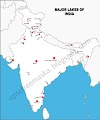What is Quantum computing ?
• Quantum computing is the area of study focused on developing computer technology based on the principles of quantum theory, which explains the nature and behaviour of energy and matter on the quantum (atomic and subatomic) level.
• Quantum Computers encode information as quantum bits, or qubits, which can exist in superposition.
• Qubits represent atoms, ions, photons or electrons and their respective control devices that are working together to act as computer memory and a processor.
• Because a quantum computer can contain these multiple states simultaneously, it has the potential to be millions of times more powerful than today's most powerful supercomputers
• Applications of Ouantum Computing :-
Quantum computers could spur the development of new breakthroughs in science, medications to save lives, machine learning methods to diagnose illnesses sooner, materials to make more efficient devices and structures, financial strategies to live well in retirement, and algorithms to quickly direct resources such as ambulances.
Quantum computing and India
• There are no quantum computers in India yet.
• In 2018, the Department of Science & Technology unveiled a programme called Quantum-Enabled Science & Technology (QuST) to accelerate research on Quantum computing.
Quantum computers vs classical computer
• Classical computers process information in a binary format, called bits, which can represent either a 0 or 1. Quantum computers, in contrast, use logical units called quantum bits, or qubits for short, that can be put into a quantum state where they can simultaneously represent both 0 and 1 and their correlations.
• While the bits in a classical computer all operate independently from one another, in a quantum computer, the status of one qubit effects the status of all the other qubits in the system, so they can all work together to achieve a solution.
Note:-
The government in its Budget 2020 has announced the largest ever science mission- National Mission on Quantum Technologies & Applications (NM-QTA).
About the mission
• It will be implemented by the Department of Science & Technology (DST), Ministry of Science and Technology.
• It is proposed to provide an outlay of 8000 crore over a period five years.
• The areas of focus for the Mission will be in fundamental science, translation, technology development, human and infrastructural resource generation, innovation and start-ups to address issues concerning national priorities.
• Applications which will receive boost include those in aero-space engineering, numerical weather prediction, simulations, securing the communications & financial transactions, cyber security, advanced manufacturing, health, agriculture, education and other important sectors with focus on creation of high skilled jobs, human resources development, start-ups & entrepreneurship leading to technology lead economic growth.






0 Comments
Feel free to ask any doubt in comment section